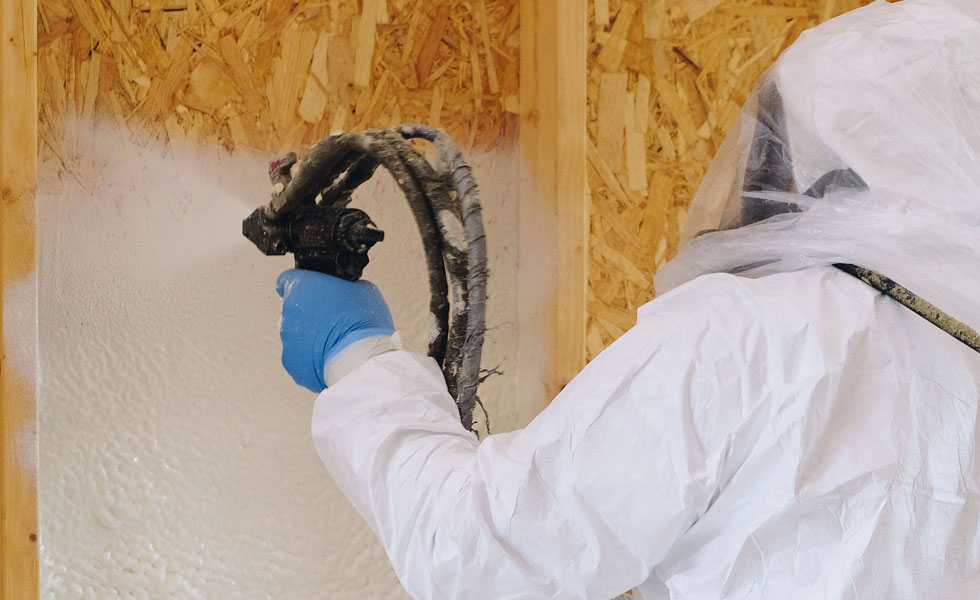Warning over rogue spray foam operators — and how to find a trustworthy installer
Spray foam can be a quick and easy way to insulate your home, but rogue installers using the wrong products can cause problems and even stop you getting a mortgage

One of the nation’s top mortgage providers has warned homeowners that choosing an untrustworthy professional spray foam installer may make remortgaging and equity release difficult for their homes.
Spray foam insulation (SFI) is a mix of liquid chemicals that expand into a foam when sprayed into position, where it sets into an insulating layer. Done properly by a professional, spray foam insulation can be a highly practical product, offering the flexibility to reach every nook and cranny quickly and easily as well as offering a decent level of airtightness to reduce heat loss.
When using the right product, spray foam can also be breathable for your home, helping to mitigate any condensation issues, according to Homebuilding.co.uk's energy efficiency expert Tim Pullen, who writes about the product in our comprehensive spray foam insulation guide.
But because the industry is (so far) unregulated, some lenders including Nationwide have raised concerns that it is enabling unscrupulous and unqualified firms, who don't use the correct foam type, to come in and damage properties.
Why rogue installers are getting it wrong
Nationwide told BBC’s Moneybox that more homeowners are enquiring about insulation thanks to a double whammy of soaring energy costs and the cost of living crisis.
But dodgy spray foam insulation may be responsible for around 250,000 homes being ineligible for mortgages because lenders are concerned about damage when using the wrong, non-breathable, product.
Some installers may use low quality or don't check if it is appropriate for the home. Using the wrong spray foam product can potentially damage beams or the roof covering due to lack of breathability, and poor airtightness can cause condensation and damp.
Get the Homebuilding & Renovating Newsletter
Bring your dream home to life with expert advice, how to guides and design inspiration. Sign up for our newsletter and get two free tickets to a Homebuilding & Renovating Show near you.
Surveyors commissioned by mortgage lenders cannot easily assess a property’s timbers to assess whether the correct product has been used once spray foam insulation has been installed. Often, therefore, it is down to relying on certification to prove what work was completed.
There is currently no industry code of practice and unscrupulous installers are under no obligation to tell homeowners that the product they use could be problematic.
How the IMA is working to eliminate rogue traders
A group of stakeholders backed by the Insulation Manufacturers Association (IMA), which includes spray foam manufacturers and installers, surveyors, valuers and lenders, is working together to standardise installation procedures and develop inspection protocols and a Code of Practice.
Huntsman Building Solutions, a responsible spray foam manufacturer taking part in building the Code of Practice, says rogue installers are not only causing damage to people's homes, but also the spray foam industry.
"At a time when homeowners are seeking ways to make their homes more energy efficient, it's important that they can trust that their installation is free from risk," Simon Baker, Huntsman's Global President, told Homebuilding.co.uk.
"As a responsible manufacturer, we agree that homeowners need to be protected from unscrupulous and unqualified traders, not only because of the damage they cause to properties but also due to the poor reputation that is building against spray foam as a result."
One victim of rogue installers is Sandra Burton from Nottingham, who told the BBC’s Moneybox programme that she was targeted by a "cowboy" firm that put spray foam insulation in her roof. She says the foam was all over the wood and the inside of the water tank, starting a flood that caused the bedroom ceiling to collapse. In total it cost £4,500 to repair.
"I thought I was doing the right thing. Cost of living going up, energy prices going up, and I thought 'yes, I'll do it',” she said. "Terrible, absolutely terrible. They are obviously preying on the elderly. It's just awful. My husband is retired and is a very poorly man, he's got Alzheimer's. I've just got my pension so yes, it's been hard.”
Rob Stevens, head of property risk at Nationwide, added: “We are starting to see skyrocketing enquiries about this. This is a time when people are vulnerable and susceptible to taking out these products.
“We want to make sure people know the right way to do it, and are able to insulate their houses in a safe way which saves them money.”
Installing spray foam insulation the right way
In the right situation and installed by people who know what they are doing, spray foam insulation can significantly improve the energy efficiency of a building.
Tim Pullen says a good installer will carry out a survey before beginning the job, which will look at the quality of the substrate and will include U values and condensation risk calculations.
“This will determine the thickness of the foam needed and if ventilation will be needed to avoid condensation,” he adds. The survey should also identify any other potential problems and what needs to be done to prevent or overcome them.
Reputable spray foam installers like Huntsman offer certification and documentation as proof that the correct type of foam has been used in the installation process, and this can be shown to surveyors assessing your property. They have also introduced an Authorised Installer Network and 25-year warranty in a bid to tackle the rogues.
Simon Baker from Huntsman highlights the benefits of spray insulation when installed in the right way. "Installed correctly, spray foam insulation is one of the most energy-efficient and innovative products available today; capable of performing for the entire lifespan of a property.
"The spray liquid layer –open-cell foam insulation – expands by over 100 times when sprayed into ceilings, walls, and other cavities, enabling it to create an effective thermal barrier which minimises air leakage while enabling breathability.
"In practice, this means homes can retain more heat, reduce boiler usage and slash heating bills."
Sam is based in Coventry and has been a news reporter for nearly 20 years. His work has featured in the Mirror, The Sun, MailOnline, the Independent, and news outlets throughout the world. As a copywriter, he has written for clients as diverse as Saint-Gobain, Michelin, Halfords Autocentre, Great British Heating, and Irwin Industrial Tools. During the pandemic, he converted a van into a mini-camper and is currently planning to convert his shed into an office and Star Wars shrine.

